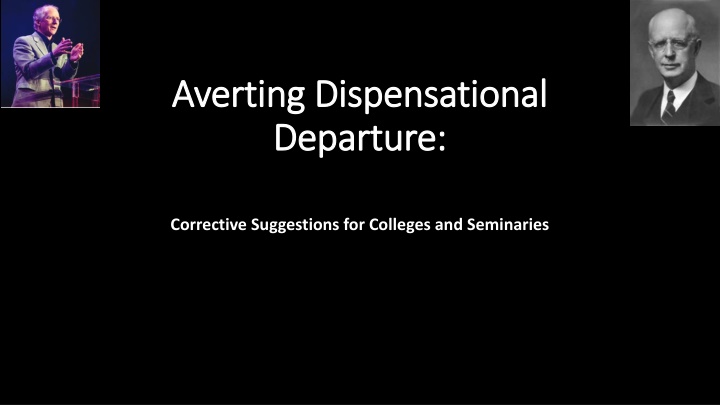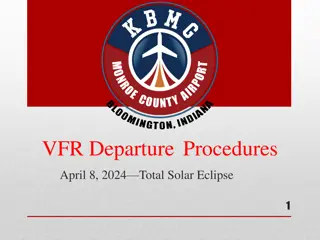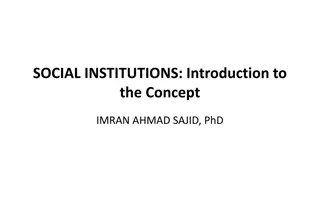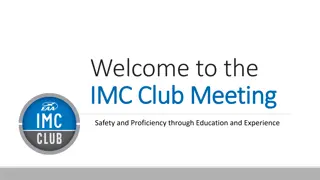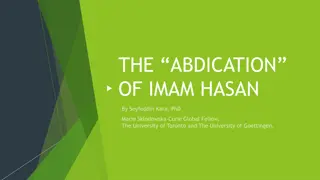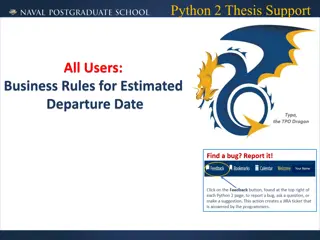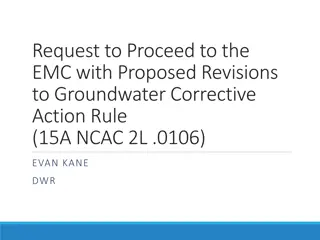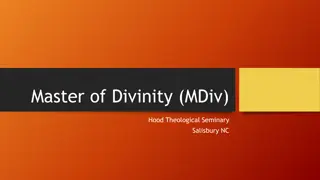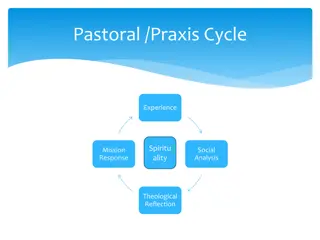Averting Dispensational Departure: Corrective Measures for Theological Institutions
A comprehensive study explores the departure of graduates from dispensational institutions, analyzing influences, alumni perceptions, and proposing recommendations to prevent theological departures. The research highlights key findings and phases of the study, shedding light on solidly dispensational institutions identified in the process.
Download Presentation

Please find below an Image/Link to download the presentation.
The content on the website is provided AS IS for your information and personal use only. It may not be sold, licensed, or shared on other websites without obtaining consent from the author.If you encounter any issues during the download, it is possible that the publisher has removed the file from their server.
You are allowed to download the files provided on this website for personal or commercial use, subject to the condition that they are used lawfully. All files are the property of their respective owners.
The content on the website is provided AS IS for your information and personal use only. It may not be sold, licensed, or shared on other websites without obtaining consent from the author.
E N D
Presentation Transcript
Averting Dispensational Averting Dispensational Departure: Departure: Corrective Suggestions for Colleges and Seminaries
Dispensational Departure Dispensational Departure 2015 PhD Dissertation, New Calvinism: A Theological Evaluation 2018 DMin Thesis, Averting Dispensational Departure: Corrective Suggestions for Colleges and Seminaries March 12, 2009, issue of Time, David Van Biema identified New Calvinism as one of the 10 Ideas Changing the World Right Now.
Dispensational Departure Dispensational Departure Four Goals of the Thesis-Project: Determine what percentage of graduates from dispensational institutions end up departing from a dispensational theology to some other theology. Determine the major influences leading some alumni to depart from a dispensational position. Understand what those who departed perceived to be the strengths and weaknesses of their alma mater. Make recommendations to dispensational ministry training institutions as to how they might prevent future departures from a dispensational position and provide a more consistent, coherent and defensible theological foundation for their alumni.
Dispensational Departure Dispensational Departure Three phases of research: Academicians and scholars who attended the 2017 annual session of the Council on Dispensational Hermeneutics polled to determine educational institutions that were solidly dispensational in their theology. Eighteen were identified. Deans and vice presidents of these schools were asked for permission to conduct a survey of their alumni. 174 alumni participated. Seven individuals selected to narrate the story of their migration away from Dispensationalism.
Dispensational Departure Dispensational Departure Solidly Dispensational Institutions Identified: Appalachian Bible College, Mount Hope, West Virginia Baptist Bible Seminary, Clarks Summit, PA Calvary University Kansas City, MO Central Baptist Theological Seminary, Plymouth, Minnesota Chafer Theological Seminary, Albuquerque, NM College of Biblical Studies, Houston, TX College of Theology and Evangelism, Lautokaj Fiji Islands Davis College, Johnson City, NY Detroit Baptist Theological Seminary, Allen Park, MI Grace Biblical Seminary, McDonough, GA Faith Baptist Bible College and Theological Seminary, Ankeny, IA Jackson Hole Bible College, Wilson, WY Maranatha Baptist University and Seminary, Watertown, WI Shasta Bible College and Graduate School, Redding, CA Southern California Seminary, El Cajon, CA The Master s Seminary, Sun Valley, CA Tyndale Theological Seminary, Hurst, TX Virginia Beach Theological Seminary, Virginia Beach, VA
Dispensational Departure Dispensational Departure The survey of alumni was designed to determine five things: Their level of commitment to Dispensationalism when they began training at their school, Their level of commitment to Dispensationalism at the time of their graduation, Whether that commitment had changed since their graduation, If they had changed, to what theological persuasion had they changed? What were the major influences that brought about that change?
Dispensational Departure Dispensational Departure Present levels of alumni commitment to Dispensationalism: Strongly Opposed, 6.4% Have Serious Questions, 7.5% No Opinion, 4.6% Somewhat Committed, 23% Strongly Committed, 58.5% Is this 14% acceptable?
Dispensational Departure Dispensational Departure There was less than 50% agreement with the dispensational position at the time of entering their school (blue line) for every single question in the survey. At graduation (red line), these students generally had even less agreement with the dispensational position than they did at entrance, with the exception of questions 5 and 8. From the results of question 5 it appears that none of these had any greater commitment to replacement theology than they did at entrance. However, by the time they took the survey (green line), they were all firmly committed to replacement theology. There was a slight increase in percentage of those holding to cessationism at graduation, but the gains were all more than lost by the time the survey was taken.
Dispensational Departure Dispensational Departure Question 2 (Israel Church distinction) and question 4 (pretribulation rapture) both garnered the strongest disagreement at graduation among this group. These two questions represent probably the most definitional and characteristic points of Dispensationalism. Coupled with the issue of a distinction between Israel and the Church is the issue of supersessionism. The chart shows that along with strong disagreement with the distinction between Israel and the Church is a strong agreement with the position that the Church has permanently replaced Israel. This is to be expected, and demonstrates the importance of clearly teaching and strongly supporting these fundamental truths if Dispensationalism is to be successfully passed on to the next generation of Christian leaders.
Dispensational Departure Dispensational Departure For questions 1, 3, and 8, the ground that had been gained had all been lost by the time the survey was taken. This indicates the importance of a commitment to alumni for continuing education. The responses to question 4 indicate that commitment to a pretribulation rapture has significantly fallen. Very few in this group (less than 40%) were committed to a pretribulation rapture position at the time they entered their schools. But at graduation, this number fell to almost half that. This means that the students in this group not only were not convinced by their instruction that the pretribulation rapture is correct, but some were more strongly convinced by other views.
Dispensational Departure Dispensational Departure For questions 1, 3, and 8, the ground that had been gained had all been lost by the time the survey was taken. This indicates the importance of a commitment to alumni for continuing education. The responses to question 4 indicate that commitment to a pretribulation rapture has significantly fallen. Very few in this group (less than 40%) were committed to a pretribulation rapture position at the time they entered their schools. But at graduation, this number fell to almost half that. This means that the students in this group not only were not convinced by their instruction that the pretribulation rapture is correct, but some were more strongly convinced by other views.
Dispensational Departure Dispensational Departure Questions 1-3 are fundamental dispensational issues. These statistics indicate that the schools are succeeding in convincing this group of these truths (78-85%). However, question 4 on the pretribulation rapture, also significantly indicative of a dispensational position, shows an unexpected low figure (22%). This seems to indicate that students who fall into this category are not making the connection between a pretribulation rapture and other fundamental dispensational issues. This suggests that perhaps the mode of teaching about the pretribulation rapture is not taking place within the context of a cohesive theological system.
Dispensational Departure Dispensational Departure
Dispensational Departure Dispensational Departure
Dispensational Departure Dispensational Departure
Dispensational Departure Dispensational Departure
Dispensational Departure Dispensational Departure
Dispensational Departure Dispensational Departure Question 43: Please describe what you think were your school s greatest weakness and greatest strength resulting in either a failure to support their dispensational position or a success in supporting it. Strongly Opposed (6 criticisms): 1. Missing or inadequate presentation of opposing views 2. Straw man argument 3. Ungracious attitude toward those advocating opposing views 4. Failure to deal adequately with the use of the Old Testament in the New 5. Incomplete presentation of Dispensationalism as an entire, cohesive system 6. Ignoring the historical view of the church
Dispensational Departure Dispensational Departure Question 43: Please describe what you think were your school s greatest weakness and greatest strength resulting in either a failure to support their dispensational position or a success in supporting it. Have Serious Questions (3 criticisms): 1. Incomplete presentation of Dispensationalism as an entire, cohesive system 2. Straw man argument 3. Failure to address problems
Dispensational Departure Dispensational Departure Question 43: Please describe what you think were your school s greatest weakness and greatest strength resulting in either a failure to support their dispensational position or a success in supporting it. Somewhat Committed (4 criticisms): 1. Missing or inadequate presentation of opposing views 2. Straw man argument 3. Futurism of the book of Revelation questioned 4. Ungracious attitude toward those advocating opposing views
Dispensational Departure Dispensational Departure Question 43: Please describe what you think were your school s greatest weakness and greatest strength resulting in either a failure to support their dispensational position or a success in supporting it. Strongly Committed (5 criticisms): 1. Missing or inadequate presentation of opposing views 2. Incomplete presentation of Dispensationalism as an entire, cohesive system 3. Outside influences 4. Ungracious attitude toward those advocating opposing views 5. Disagreement among the faculty
Dispensational Departure Dispensational Departure Research Phase 3: The Interviews
Dispensational Departure Dispensational Departure Seven Recommendations: 1. Do not demonize your opponent. 2. Know your opponent well. 3. Provide a well-structured, comprehensive and cohesive system. 4. Show the connection between theory and practice. 5. Be both apologetic and polemic. 6. Prepare students to face future challenges. 7. Be involved in continuing education.
Averting Dispensational Averting Dispensational Departure: Departure: Corrective Suggestions for Colleges and Seminaries
